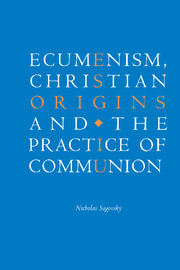Book contents
- Frontmatter
- Contents
- Acknowledgements
- List of abbreviations
- 1 The common life
- 2 Communion: Anglicans, Roman Catholics, and ecumenical consensus
- 3 Plato's vision
- 4 Aristotle's revisionism
- 5 Covenant and community
- 6 Little communities and the Catholic church
- 7 Cappadocian koinonia
- 8 Augustine and the story of communion
- 9 Ecumenism and the practice of communion
- Select biblography
- Index
5 - Covenant and community
Published online by Cambridge University Press: 22 September 2009
- Frontmatter
- Contents
- Acknowledgements
- List of abbreviations
- 1 The common life
- 2 Communion: Anglicans, Roman Catholics, and ecumenical consensus
- 3 Plato's vision
- 4 Aristotle's revisionism
- 5 Covenant and community
- 6 Little communities and the Catholic church
- 7 Cappadocian koinonia
- 8 Augustine and the story of communion
- 9 Ecumenism and the practice of communion
- Select biblography
- Index
Summary
GREEK AND JEW IN THE POLIS
One enduring legacy of Hellenistic colonisation and conquest in the ancient world was the Greek polis. For more than five hundred years in many of the great cities of the Ancient Near East the language and culture of the educated was Greek. The poleis which flourished from Macedonia to India, and from Anatolia to Egypt, whether independent or under imperial rule, were, however, vastly different to the Athens about which Plato and Aristotle wrote.
The Athens of Plato was a small and tight-knit society in which it was considered important that all the citizens knew one another. It was held together by a common history, common religious traditions, and a common politeia or constitution. For both Plato and Aristotle the experience of political koinonia, of citizenship, was a metaphor for their understanding of what it is to be human. The man who is without a polis, said Aristotle, must be super-human or sub-human. He cannot be of the same species as normal human beings.
The Hellenistic polis of the centuries after Alexander was by no means the old Greek polis writ large. It was essentially cosmopolitan, a meeting-place of peoples, cultures, and religions, often with a shadowy common culture but little sense that citizenship was for all and the ideals of citizenship in all. Under the Hellenistic monarchies, there was ‘no common citizenship, no term even to describe membership if a kingdom’.
- Type
- Chapter
- Information
- Ecumenism, Christian Origins and the Practice of Communion , pp. 97 - 115Publisher: Cambridge University PressPrint publication year: 2000



